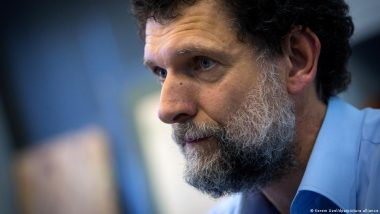The Turkish human rights activist has been imprisoned in Turkey since 2017. Erdogan's government considers Kavala an enemy of the state. DW was able to contact him and learned why he still has hope in spite of it all.Three years ago, when DW visited Osman Kavala in prison, he was still certain he would soon be released. But things turned out differently.
Also Read | India News | Himachal CM Directs Officials to Bring Back Students Stuck in Manipur.
Kavala spent four years behind bars awaiting a verdict in his case.
Also Read | India News | Man Arrested for Attempt to Lure People to Convert to Christianity in Gorakhpur.
Then in April 2022, an Istanbul court sentenced him to life in prison. The global outcry was enormous, with Germany one of the world governments to condemn the verdict.
Kavala, an entrepreneur, civil rights activist and philanthropist, is accused of organizing and financing the 2013 Gezi protests, which were initially directed in opposition to the construction of a shopping center, and then later against the government of president Recep Tayyip Erdogan.
For the DW documentary "Osman Kavala: A Voice from Prison" DW reporter Linda Vierecke was once again able to interview him — this time in writing.
DW: Why is the government so worried to see you free?
Osman Kavala: My extended imprisonment helps to sustain the perception that the bogus charges against me have validity. The president stated several times that my guilt is the reason for my imprisonment. This message can also be understood as my imprisonment is the indicator of my guilt. If I were to be released, it would become clear that the charges against me were of a bogus nature and Gezi was a show trial.
How were you involved in the Gezi park protests 10 years ago?
When I first learned about the government's plan to build a shopping mall that would totally destroy the park, I joined my colleagues in a campaign to convince the government and the public that this was a terrible idea.
My office is almost adjacent to the park. This made it possible for me to observe the young people gathering in the park and talk with them. I was impressed by their determination to protect the park, their strong sense of justice, and the spirit of solidarity among them. The majority of them had no ties with an organization and probably it was their first time participating in such an action. During the protests, I brought a loudspeaker and a plastic table to the park. These, in addition to some cookies, constitute the evidence, the only evidence, provided in the indictment in support of the allegation that I had funded the protests.
What do you think about that accusation of the government that you were behind the Gezi protests — which they have never proven?
Nowadays in Turkey, as long as the government considers someone guilty, making serious attempts to identify and determine the criminal act and to search concrete evidence in support of the alleged crime no longer constitutes an imperative in putting someone behind bars.
In my case, Mr. Erdogan started making grave accusations against me even before the indictment was prepared. I think neither the government nor the prosecutors who had prepared the indictment actually believe in the absurd allegation that I planned and organized the protests in collaboration with George Soros (Kavala was among the founders of the Turkish branch of US philanthropist George Soros' Open Society Foundation, which promotes democratic movements but suspended its activities in Turkey in 2018 — Ed.). It was clear from the very beginning that the protests developed spontaneously and had no central command structure.
Do you agree with the argument that the government is trying to send a message to the Western world by punishing you?
I think several messages were given by my persecution, and they were mostly directed at the domestic audience. As also stated in the ECHR (European Court of Human Rights — Ed.) decision of 2019 regarding my case, my arrest conveys a message to the civil society activists, warning them not to be involved in activities seen as disruptive by the government.
The narrative of foreign powers organizing a conspiracy against the government was prepared to criminalize the Gezi events and it was also used to stigmatize other street demonstrations.
Moreover, this trial sets an example for the judiciary, guiding them on how to act and decide in accordance with the government's perception and priorities.
The ultimate message here is that if the president, as the sovereign authority, considers someone guilty, domestic or international law cannot prevent his or her persecution.
You supported so much work in Diyarbakir — especially in the Kurdish community. Why was that important for you? Did you ever see that as a dangerous involvement?
I had the opportunity to visit Diyarbakir and the other southeastern cities at a young age. This experience made me realize that this region of my country is very different. My conversations with Kurdish friends helped me to better understand how they feel in the face of the repressive and discriminatory policies the Kurdish citizens are subjected to, as well as the different political environment in the region.
I thought that promoting personal contacts, communication, and collaboration between the artists, writers, and intellectuals from Istanbul and Diyarbakir would contribute to the development of mutual understanding, hence trust, which is necessary to feel ourselves as members of the same community. According to my experience, art and artistic programs considerably contribute to building mental and emotional bridges; they enable contemplation and discussion of issues of political content in a non-antagonistic atmosphere.
Why do you think you have become one of the main targets of the government?
In the indictment prepared against me it is written that I have worked with the minority groups in order to incite them against the government, and these activities were carried out behind the veil of cultural programs. We have been working in southeastern Turkey for the last 20 years, and it is the first time such a bogus accusation was made by an official authority. I think this shows the rise of an authoritarian mentality with an anti-minority edge in the political domain.
Knowing that it is dangerous to get involved in such issues, why did you choose to enter this "minefield"? You could have simply focused on earning money, like many others...
Earning money is fine. But I think that to live in a society where people of different faiths and ethnicities feel as equal citizens, and where poor and rich enjoy similar public services, is a great privilege and believing that your work contributes to the advent of such a society also gives a feeling of enrichment, despite some risks it entails.
Tell us about your daily routine in prison: What do you do with your time?
I don't have much to complain about the conditions and treatment here. I think this is one of the better managed prisons in Turkey. I am staying in a single room. I spend my time mostly reading, especially fiction, a vital activity for me to maintain my mental health. I watch the news on independent TV channels; I also get papers daily in my room. During the day, I have the opportunity to use my small courtyard to walk.
In summer, I feed the sparrows that have their nests up above the walls. I catch glimpses of seagulls flying over in the direction of the sea. I also enjoy watching the clouds, their shapes and movements. These make me feel closer to nature.
I receive letters from friends and often from people whom I did not know before. I try to write them back. I can talk with my wife by phone with a glass panel between us for an hour each week; once a month without the screen. There is no time limit to meeting with lawyers.
If the verdict of an aggravated life sentence is confirmed by the Court of Cassation (The last instance for reviewing verdicts given by courts of criminal and civil justice in Turkey — Ed.), the conditions will be much worse.
What was your first reaction to the aggravated life sentence? How do you feel now?
I was expecting to be sentenced to several years of imprisonment, as it was needed to justify my long and arbitrary detention. But I did not imagine that they would sentence me to life imprisonment using the same evidence that the European Court of Human Rights found insufficient even for my arrest.
In the earlier hearings, extension of my detention without proper reasoning used to trigger a strong feeling of injustice in me. When I heard the verdict, what I felt was deep sorrow for the state of the judiciary and the judges in my country.
There are many prisoners who are detained or sentenced by means of arbitrary decisions, and quite a number of them have been behind bars longer than myself. However, I think the different phases of this political trial, the use of different charges to extend my detention, and finally this verdict made very clear the manipulation involved in the judicial processes in Turkey and the abuse of the Turkish penal system. I try to preserve my tranquility of mind and wait for a political change in my country.
The election is coming up soon. What hopes and fears do you have?
The fact that six opposition parties from different parts of the political spectrum have made an alliance and that they have prepared a detailed program outlining how they would govern Turkey together is very promising.
The program prioritizes restoration of rights and liberties, return to the parliamentary regime and securing the independence of the judiciary. I think the deteriorating economic situation and the experience of the earthquake, which fostered the feeling that the government was not able to save the lives of its citizens, have strengthened popular demands for change.
It is very likely that the ruling block of AKP and MHP, the nationalist party, may lose their majority seats in the Parliament and Mr. Kemal Kilicdaroglu could win the presidency. The pro-Kurdish HDP, though not part of this six-party alliance, would probably support him.
I am hopeful about the future of Turkey. We have a strong political opposition with a deeply rooted tradition and organizational network. The opposition won almost all mayorships of important metropolitan cities in the last local elections. There is space for democratic political and civil activity which cannot be stifled, and which would prevent a shift into a close authoritarian system even if the opposition may not win in the forthcoming elections.
Edited by: Petra Lambeck; Tanya Ott
(The above story first appeared on LatestLY on May 08, 2023 08:20 PM IST. For more news and updates on politics, world, sports, entertainment and lifestyle, log on to our website latestly.com).


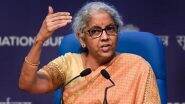
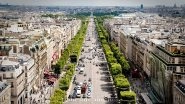

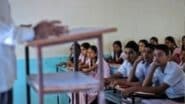





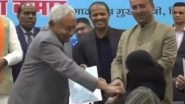

 Quickly
Quickly








